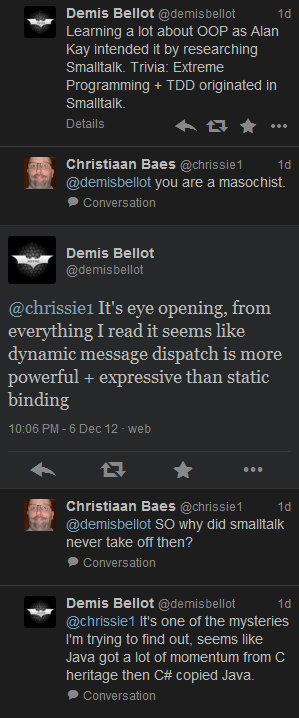Introduction
A few days ago [Demis Bellot][1] (the creator of Servicestack) was talking about [Smalltalk][2] on twitter. A little discussion came about involving [Alex Ullrich][3].
So my next mission was to learn a thing or two about smalltalk myself.
Installation
I tried two smalltalk IDE’s. [Squeak][4] (which I couldn’t get to work on Win8) and [Dolphin X6 community edition][5].
So I stuck with Dolphin. And the installation is next, next, next and finish.
The beginning
So how does one learn Smalltalk, on starts with finding a good tutorial. And I found a very good one by Bitwise magazine.
[Lesson 1][6] has Dolphin and Squeak in it but from [Lesson 2][7] you can go to a dedicated Dolphin page(s).
Just follow that tutorial and you will be fine.
To be honest, smalltalk is weird. I have done a few languages in my time, lots of basic dialects (visual basic, turbobasic VBA, …), lots of c dialects (C++, Java, C#, javascript, PHP, …), COBOL, Delphi, and some I have forgotten what the syntax looks like. Smalltalk however is nothing like the previous languages.
It uses the comma to concatenate strings.
'Hello',' World!'.```
It uses the dot as a line-ending character.
It uses square brackets for blocks of code.
```smalltalk
1 timesRepeat: [Transcript clear.
Transcript show: 'Hello'; cr.
Transcript show: 'Hello2'; cr.].```
It uses the space as a seperator character to define arrays.
```smalltalk
mixedlist := #( 'one' 2 (3 4 5) $6 ).```
It uses capitalization to determine scope, variables starting with an uppercase letter are Global scope, variables with a lowercase are local to your workspace.
And there are many more things you will discover.
Learning something like smalltalk is really cool. It opens your eyes a bit.
## Conclusion
Go ahead, download dolphin and follow the bitwise tutorial, you will learn something new if you have never tried smalltalk before.
[1]: https://twitter.com/demisbellot
[2]: http://en.wikipedia.org/wiki/Smalltalk
[3]: /index.php/All/?disp=authdir&author=5
[4]: http://en.wikipedia.org/wiki/Squeak
[5]: http://www.object-arts.com/
[6]: http://www.bitwisemag.com/copy/programming/smalltalk/smalltalk1.html
[7]: http://www.bitwisemag.com/copy/programming/smalltalk/dolphintutorial.html





 Chris is awesome.
Chris is awesome.